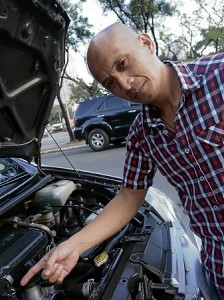The ordeal of duped owners
(Fifth in a series)
Car dealerships, or casa, serve as the “face and hands” of the brand. The casa is where the interface between customer and manufacturer happens. It’s where a lasting personal or business relationship, or a lifetime of enmity, is formed. Here are two examples of the latter.
Dead on the highway
In 2011, Ruston Banal Jr., a freelance photographer and university professor, bought a brand-new China-made minivan worth about P500,000 in San Fernando, Pampanga, through a bank loan.
He related to Inquirer Motoring that in less than three months after purchase, the engine developed a major problem. In one particularly frightening incident, the engine died while he was driving about 90 kph on the highway.
This happened again several times. Ruston related it would take him 10 to 15 attempts before the engine would restart. The clutch, which Ruston said was another problem altogether, made the vehicle stutter “like a horse” everytime he started the engine or shifted to first gear.
Ruston brought his vehicle back to the casa along with a complaint letter. The casa claimed it had all the problems fixed when it returned the vehicle to Ruston. But when he drove it home, the clutch problem was still there. Worse, the air-conditioning system was acting up, as well.
Soon afterwards, the engine started stalling once more. Then the battery, which was just a year old, became discharged.
Ruston took the vehicle back to the casa, but the service and repair department said that his vehicle was no longer under warranty.
Problems unresolved
“To my disappoinment, I left the casa and had it repaired by my relative-mechanic. Since the cost of the repair would be so expensive, especially in procuring the materials and parts, I only had the aircon repaired. The clutch and engine problems were unresolved.”
In October 2012, the clutch failed completely, and the gear wouldn’t shift. Ruston had the MPV towed to his relative’s shop. The clutch repair set him back P10,000. Still, the issue of the stalling engine was untouched.
Ruston talked to the vehicle dealer’s marketing manager, who offered to take the vehicle in for evaluation. Ruston agreed and took the vehicle back to the casa.
After several weeks, the casa called and charged Ruston P22,000 for the “evaluation” and repair services.
That was the final straw. After paying a quarter of a million pesos for the vehicle since 2011, an exasperated Ruston said he was no longer interested to pay any more monthly amortizations on the vehicle.
“I am willing to have it repossessed (in Ruston’s word, ‘ipahila’) even if it means all my previous monthly payments would have gone with the wind. This is grossly unfair! But before that, I will file a complaint to the DTI (Department of Trade and Industry) as well as ask for a demand letter from a lawyer about this.”
Not alone
Ruston claims he is not alone in this nightmare. He said he knows of other owners of the same vehicle who have experienced the same problems.
Ramil Sasi, an instructor at a premier university in Manila, bought his family’s first brand-new mini MPV (2010 model) from a brand he admired most. In his own words, the quality of the automaker had been “very satisfactory, having tried several old models or second-hand cars made by it”. He bought this automaker’s MPV as it also fit his family’s modest budget.
One time, he took the vehicle to its Manila casa for the scheduled PMS (preventive maintenance service). Included in the service was the so-called brake cleaning, costing several hundred pesos and would require taking the hub caps, and the tires, off.
Puzzled with service
After claiming the vehicle and driving it back home, Ramil noticed that the nylon cord he customarily tied over his wheels’ hub caps to prevent them from falling were untouched. They were fastened exactly the way he left them when he brought it to the casa for servicing. “How could the casa people have performed the brake cleaning without removing the hub caps and tires?” he wondered.
Ramil aired this observation when the casa called up to follow up on its after-service. “There was no return call after that, to apologize or anything, so I never returned to that casa after that.”
Ramil decided to have his MPV’s next PMS done at a casa nearer his home in Cavite. He said he was initially delighted to see that the customers of this casa could lounge on the second floor and see their vehicles being serviced. And so, Ramil watched his MPV being serviced from his second-floor vantage point.
Among the services performed on Ramil’s vehicle that day, and which was charged to him, was for the tightening of bolts costing a few hundred pesos. But here’s the catch: Ramil said he never saw his vehicle raised on the lifter, which would be a prerequisite for the service. He insisted that the whole time he was there, he also never saw any one of the mechanics performing the service. Ramil also checked if there were marks on the bolts that would suggest they were tightened and found that there were none.
“I relayed my complaint, but no attempt of reparations came. I even remember that I had to ask the service advisor to return the excess of nearly a liter of synthetic oil since I bought four liters of oil, as the casa requested, when in fact the car needs only three liters of oil.”
Ramil concluded: “After those horrendous experiences I now hesitate to ever come back to any casa again. All I am doing now is get pointers from social networking sites, and research for better services for my car.”
(To be continued)
Share your casa stories— pleasant or unpleasant—to tsalazar@inquirer.com.ph.


